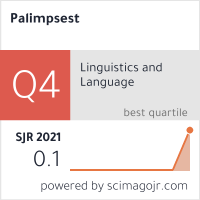OBSERVATIONS ON A SUBGROUP OF LIGHT VERB CONSTRUCTIONS WITH DAVA IN WHICH THE METAPHORICAL EXTENSION OF INTERPERSONAL COMMUNICATION IS PRESENT
DOI:
https://doi.org/10.46763/PALIM21612017siAbstract
This paper focuses on a subgroup of Macedonian light verb constructions (LVCs) with дава (give) which can be interpreted as a transfer of a verbal message from the first to the second human participant, as one of the possible metaphorical extensions of (give) is in the field of verbal communication. The second participant is oftentimes not overtly expressed on the surface of the text, but can be reconstructed from the context. These LVCs are mainly based on verbs of speaking and some verbs of cognition, and unlike the LVCs based on deontic verbs of communication, in these constructions the first participant does not try to alter the behavior of the second human participant. Although it may seem at first sight that LVCs (with their verbo-nominal structure) are simply stretched versions of already existing full verbs (FVs), yet there is no absolute synonymity and interchangeability between them. The rationale behind the use of a LVC as opposed to its full verb (FV) counterpart lies in the information structuring potential of LVCs (evident in the possibility for reduction of arguments), as well as the advantages offered by presence of a nominal component in the LVC, such as quantification and premodification by adjectives.
Keywords: light verb constructions; light verbs; metaphorical extensions; give.


